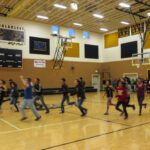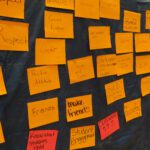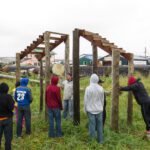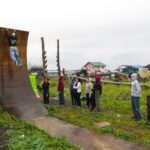Fun, games, and empowerment — all part of the annual youth leadership retreat hosted by the Bering Strait School District (BSSD) and Nome Public Schools earlier this month. Fifty students gathered in Unalakleet on Sept. 11 for a weekend of teambuilding and tackling tough issues.
“This generation has a lot of hard issues, [especially] with the older belief that everyone should keep it to themselves,” said Kevin, a high schooler from Unalakleet. “If this new generation can express themselves — as they were truly meant to be — it’ll be happier generation. And also a great one to be in.”
Kevin joined students from across the region — all nominated as youth leaders by their school communities — in learning how to approach some of the challenges facing young people.
Chief among them: Suicide. Alaska has one of the nation’s highest suicide rates — and Alaska Native youth are especially at risk. But Lisa Ellanna told students that solutions — and support — can come from within the youth community.
Ellanna is wellness director at the Maniilaq Association, and she encouraged youth leaders to reach out to friends and classmates. Ellanna said social media is one space where people open up about battling depression or considering suicide — and youth leaders should be on the lookout for opportunities to help.
“When you see posts where people are talking about feeling alone, hopeless, or isolated — or how life sucks for them right now — contact that person,” said Ellanna. “Message that person. Make sure they know that they’re not alone.”
Carl White — an administrator with BSSD — also showed students how to call a crisis phone line. With a responder on the line, he emphasized that such resources are not just for those thinking about suicide.
“Question for you. Sometimes I just need somebody to talk to,” White said to the responder. “I don’t want to necessarily hurt myself, but I live in a small village and everybody knows me. What can I do?”
The responder told youth leaders that anyone can call or text — whether they need help for themselves, help for a friend, or just someone to listen.
At the retreat, youth leaders also discussed stereotypes — and how they can affect self-esteem. Pananga Pungowiyi is Kawerak’s wellness director, and she spoke with students about the stereotypes they see in movies, magazines, and other media.
“Media affects how we view race and how we view gender,” Pungowiyi said. “That affects people on a very real, everyday basis. And it is something that perpetuates harm in our communities — harm against anybody who deviates from the ‘norm.’”
Students dissected the idea of the norm by looking at catalogues and movie clips and studying how men and women were portrayed differently — as well as white people and people of color. Kaley Slingsby said the point is for students to be mindful of stereotypes and to keep those ideas from harming how they treat themselves and each other.
“If there’s a boy who wants to take ballet, that’s ok. If there’s a girl who wants to try out for football, that’s okay,” said Slingsby, a counselor at Nome-Beltz Jr/Sr High. “We put people in these stereotypes and these roles, thinking that we have fit in a certain box, rather than just being who we are.”
But by the end of retreat, the message to youth leaders was that being who you are — and helping those around you — is the best thing you can do.
Crisis Phone Line Resources
1-800-273-TALK
1-800-SUICIDE
Crisis Text Line Resources
Text “Start” to 741-741
Text “4help” to 839-863 (Tuesday-Saturday 3 a.m.-11 p.m.)











